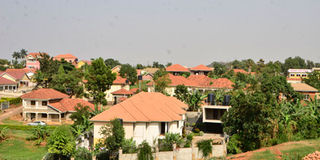Government rejects real estate request to reduce taxes

Real estates. Ms Shirley Kongai, the Association of Real Estate Agents Uganda president, had earlier said taxes, which contribute about 50 per cent of the cost of investment, are a major obstacle to reduction in housing cost. FILE PHOTO
What you need to know:
- Mr Chris Baryomunsi, the Housing state minister, said efforts to reduce the cost of mortgages are being worked on through a World Bank scheme that will advance $150m (Shs560b) to National Housing and Construction Company to provide a cheaper source of credit in the sector.
- The real estate sector, according to Association of Real Estate Agents Uganda continues to be mainly informal because of the absence of clear regulations.
Kampala. Government has turned down pleas from players in the real estate sector asking for tax exemptions and pardons.
Speaking during the Uganda Real Estate Investment Conference in Kampala yesterday, Finance minister Matia Kasaija, said tax exemptions cannot be applied in a sector such as real estate because it is a key source of government’s revenue.
“Source of revenue of government is from nowhere except taxes. So you should never complain about taxes. Maybe complain if it is too much or oppressive,” he said, arguing that real estate players should instead point out opportunities on how government can impose new taxes in the sector to boost government revenue.
An increase in taxes, he said, will serve to build infrastructure, whose absence or insufficient supply, has been a major contributor to the high cost of housing.
Mr Kasaija was responding to a plea by the Association of Real Estate Agents Uganda, who had asked government to consider tax incentives or pardons for the real estate sector.
Ms Shirley Kongai, the Association of Real Estate Agents Uganda president, had earlier said taxes, which contribute about 50 per cent of the cost of investment, are a major obstacle to reduction in housing cost.
However, Mr Kasaija tasked real estate developers to indulge in research that can allow them to develop cheap materials to cut down on the cost of housing. According to the Ministry of Land, Uganda has a housing deficit of about 2.4 million units.
However, the realisation of affordable housing according to Ms Kongai will be centered on more rather than taxes. She said, affordable housing is stretched by the high cost of land and capital for investment among others.
Mortgages, a key factor in reducing the cost of housing, according to market analysis, cost an average of 18 per cent and carry short payment period, which makes it unattractive.
Mr Chris Baryomunsi, the Housing state minister, said efforts to reduce the cost of mortgages are being worked on through a World Bank scheme that will advance $150m (Shs560b) to National Housing and Construction Company to provide a cheaper source of credit in the sector.
The real estate sector, according to Association of Real Estate Agents Uganda continues to be mainly informal because of the absence of clear regulations.
Landlord-Tenant Bill
The Landlord and Tenant Bill which was introduced in April, is still awaiting deliberation in Parliament.
It seeks to, among others, limit payment of rent in foreign currency as well as define the tenant-landlord relations.
However, it has faced some resistance with landlords claiming that the bill will weaken the real estate sector.
The Bill, Mr Baryomunsi said is being finalised and is expected to be tabled in Parliament next week.
The conference held under the theme: Building opportunities, creating cities rounded up many real estate sector players who discussed the means of bringing down the cost of housing.




